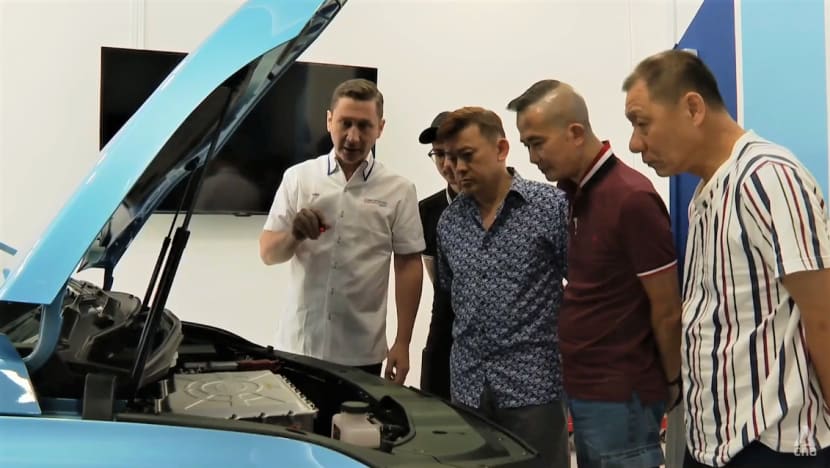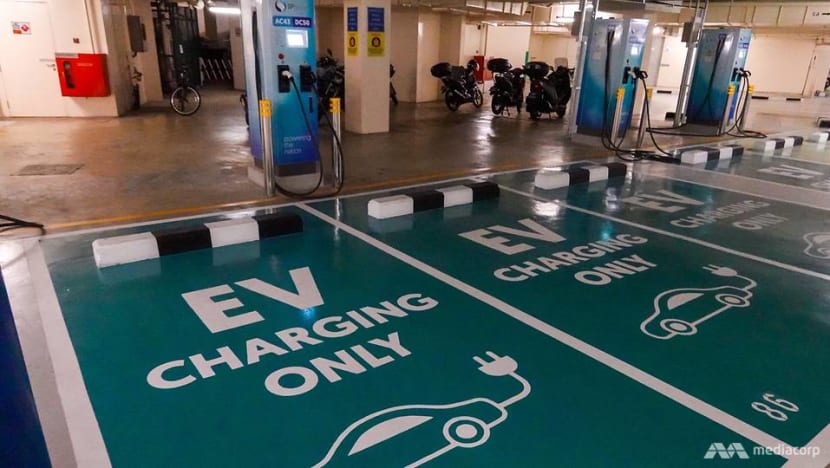Only 2% of Singapore’s automotive technicians have geared up on safety training for electric vehicles
Industry players said the lukewarm response to the courses is due to uncertainty around the maintenance needs of EVs and a lack of information from manufacturers.

Participants attend a automotive course in Singapore.
SINGAPORE: More training courses on the safe handling of electric vehicles (EVs) are now available in Singapore, as the nation sets out on a major push for the adoption of more environmentally-friendly transport.
While the industry has seen an increase in interest for the courses, the Singapore Motor Workshop Association said that only around 2 per cent of automotive technicians in the country have received such training. The association oversees about 600 workshops.
EVs are equipped with high-voltage systems which technicians should learn to safely handle as the voltage is high enough to pose risks of electrocution or cause injuries.
Industry players said the lukewarm response to the courses is due to uncertainty around the maintenance needs of EVs and a lack of information from manufacturers.
EV SAFETY COURSES
Transport company ComfortDelGro is among the firms offering the National Electric Vehicle Specialist Safety (NESS) certification programme.
Its seven-day course is spread over seven weeks, and offers a mix of theory and hands-on practice.
The curriculum teaches students about the different parts of an EV and how to handle them safely. There are also modules on maintenance, diagnostics, and troubleshooting.
Participants will also be able to learn about the inner workings of an EV with a jig developed by the firm that provides an “X-ray” view of the mechanisms without needing to dismantle the vehicle.
This will allow attendees to visualise the connectivity between the high voltage components within the car, said Mr Andrew Cheok, head of ComfortDelGro Engineering’s training academy.
Mr Cheok said the course’s trainers are also automotive technicians who help to manage and maintain the EV fleet of the company’s signature blue taxis.
After the course, students are awarded with two certificates – one from the Land Transport Authority (LTA) and another from TUV SUD, a German testing, inspection and certification firm.
The firm said about 100 people have signed up for the course since it started in November last year. About 70 per cent of participants were between 40 and 60 years old.

Almost two-third of the students were from the automotive industry while the rest were made up of people considering a mid-career transition into the EV sector, car enthusiasts and those who own or intend to own EVs.
LACKLUSTRE INTEREST
Singapore has about 2,000 automotive workshops and some 10,000 technicians.
Many conventional motor workshops told CNA they are in no rush at the moment to send their workers for EV safety training.
The main reason behind the reluctance is warranty – EV purchases include warranties of up to between 8 and 10 years. Hence, EV owners facing issues with their vehicles are likely to go back to their distributors instead of approaching a workshop.
Some workshops also find it hard to free up manpower for training, as regular Internal Combustion Engine (ICE) vehicles are still dominant in the market.
“With our existing business, our workshop is already packed. So to devote time for employees to go down (for EV training), there are opportunity costs, and the costs are high,” said Mr Teng Dao Xiong, managing director of 1 Car Service Workshop.
“Plus, if our capacity is already more or less filled, then the additional business of EVs is not going to add much profits to the company.”
The Singapore Motor Workshop Association said most courses are focused on safety and there is a lack of syllabus on the repair and maintenance of EVs.
“Repairing an EV is still very ambiguous. Because what are you repairing? Brakes? Lights? Audio? Those are the same as conventional vehicles,” said SMWA President Mike Keh.
“You can’t repair EV batteries – perhaps you can change them but that will be seven years down the road (after their warranties expire).”
While some in the industry are keen to learn more skills in repair and maintenance, lack of information and knowledge sharing from EV manufacturers have left the sector at a loss of what and how to learn.
“Many workshops have asked us for advanced EV courses,” said Mr Keh.
“But we can't provide anything because every manufacturer has its own EV models, which are proprietary to them and they will not divulge any information at all.”
Some workshops said they are only planning to send their technicians to training in three to five years’ time, when EVs become more popular and command a larger market share.
DEMAND SET TO ACCELERATE
Singapore has seen a surge in take-up for electric cars in recent years, and the country is set to have all vehicles run on cleaner energy by 2040.
A growing number of petrol stations in Singapore are offering a more diverse range of non-fuel services, and the Government is building an island-wide network of EV chargers.
With the rise in the number of EVs in the nation inevitable, automotive technicians will sooner or later need to equip themselves with skills to stay relevant, said industry players.
“As Singapore accelerates the electrification of the vehicle population, technicians will increasingly want to upskill themselves so that they can be confident in handling high voltage components in EV cars,” said Mr Cheok.
Industry players are calling on the Government to do more for workshops as EVs become a more common sight on Singapore's roads, such as encouraging manufacturers to share information and issuing licences to technicians who have gone through training courses.



















